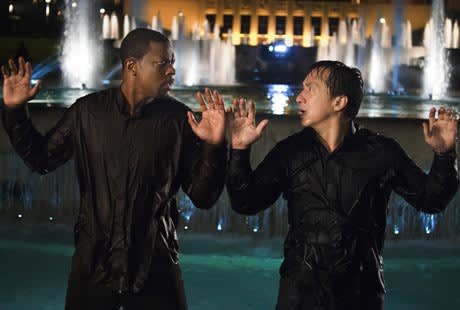Theres something almost charming in how bad the latest sequel in the Rush Hour franchise is, finally emerging six years after the last instalment.
Chris Tucker and Jackie Chan reprise their roles as Carter and Lee, this time on the hunt in Paris for a MacGuffin known as "Shai Shen that could end the existence of the Triads. While its predecessors at least pretended to have coherent plots, in Rush Hour 3 our heroes dont understand, or even care to understand, whats going on around them, and yet everything falls into place for a happy ending.
Director Brett Ratner and writer Jeff Nathanson have unintentionally crafted a film that manages to parody itself. It represents the confused, simplistic view of the world that we imagine an American in unfamiliar waters would possess as they attempt to mock that very conceit.
For example, the man Lee calls "brother is played by Hiroyuki Sanada, a Japanese man. They explain it away weakly half-way through but its easy to see Sanada cast in the role because, well, hes "an Asian. After all, theyre all the same, right? Similarly representative is the anti-American cabbie George, who upon realising Americas greatness because of the violence and destruction Carter and Lee have brought (really) begs, "I want to know what it is to be an American. I want to know what it is to kill without reason. Thanks to that line, the conclusion of the film would be bone chilling if it didnt confirm the film as a masterwork of unintentional meta irony.
Though the original Rush Hour films were lowly, they were somehow strangely watchable. Rush Hour 3 however forgets to include anything that made the previous films passable theres not one decent fight scene or stunt in the entire movie.
Also, Roman Polanski appears as a French policeman that literally molests our heroes. His obvious oblivion to the irony of this shows such a lack of self-awareness that it almost makes the rest of the film look good by comparison. Not quite, though.
(Alliance Atlantis)Chris Tucker and Jackie Chan reprise their roles as Carter and Lee, this time on the hunt in Paris for a MacGuffin known as "Shai Shen that could end the existence of the Triads. While its predecessors at least pretended to have coherent plots, in Rush Hour 3 our heroes dont understand, or even care to understand, whats going on around them, and yet everything falls into place for a happy ending.
Director Brett Ratner and writer Jeff Nathanson have unintentionally crafted a film that manages to parody itself. It represents the confused, simplistic view of the world that we imagine an American in unfamiliar waters would possess as they attempt to mock that very conceit.
For example, the man Lee calls "brother is played by Hiroyuki Sanada, a Japanese man. They explain it away weakly half-way through but its easy to see Sanada cast in the role because, well, hes "an Asian. After all, theyre all the same, right? Similarly representative is the anti-American cabbie George, who upon realising Americas greatness because of the violence and destruction Carter and Lee have brought (really) begs, "I want to know what it is to be an American. I want to know what it is to kill without reason. Thanks to that line, the conclusion of the film would be bone chilling if it didnt confirm the film as a masterwork of unintentional meta irony.
Though the original Rush Hour films were lowly, they were somehow strangely watchable. Rush Hour 3 however forgets to include anything that made the previous films passable theres not one decent fight scene or stunt in the entire movie.
Also, Roman Polanski appears as a French policeman that literally molests our heroes. His obvious oblivion to the irony of this shows such a lack of self-awareness that it almost makes the rest of the film look good by comparison. Not quite, though.
